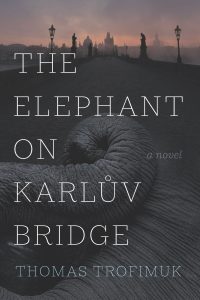In Thomas Trofimuk’s amazing, inventive new novel we encounter not only a runaway zoo elephant remembering haunting, musical echoes from a heritage of free roaming but also a bridge celebrating its endurance and prominence as a Prague landmark. As narrator, the bridge can sound like a lecturer recounting crimes committed in the name of religion over its 661-year history or a tour guide itemizing the statues along its length. Expect, at times, a salty voice quite capable of declaring a regular visitor “nutty as a fruitcake” and, at intervals, reminding readers that “it remains my mission to get you safely from one side of the river to the other.”
The bridge’s commentary is so enjoyable that we can forgive Trofimuk for underlining story structure he thinks we might have missed: “The elephant is, of course, a thread that runs through the fabric… novels (if you can call this story-puzzle a novel) don’t have to tie up the loose ends every single time. Right?”
It’s no surprise that the Karlův serves as a bridge between stories focusing on an assortment of characters whose lives criss-cross in currents like the river flowing beneath. We first meet Vasha, an author with writer’s block working as a night watchman at the zoo, worrying about the prospect of becoming a father. His wife, Marta, is a therapist treating a ballerina whose body is telling her it’s time to quit. Šárka, the dancer, has ongoing conversations with a long-dead Anna Pavlova. Another of Marta’s clients is Lem, who was once a Czech soldier working in Africa—where, in a horrific scene, he recalls encountering poachers ready to murder children as well as elephants—and is now a bodyguard to a Swiss banker’s fiancé. Into this mix add Joseph, a busker who does clown turns on the bridge, and Mercy, a recovering alcoholic and Scottish lighthouse keeper who comforts Joseph when her taxi knocks him down.
It’s a cast such as you might find in a Cecil B. DeMille movie. No accident, I think, that Joseph’s cat’s name is Buttons, after the clown in DeMille’s The Greatest Show on Earth. To the author’s credit, we come to care about all of these characters—their dreams, regrets, loves. And then there is Prague itself, the medieval city lovingly presented—its cafes, boulevards, churches, cemeteries, zoo. Trofimuk paints it in colours: “pallid yellow sandstone, sepia facades, burnt sienna… If Paris is the city of light, then Prague must be the city of shadow.”
The wandering narrative buoyed by humour while it tackles human peccadilloes and societal caprices has been with us since Cervantes and Laurence Sterne. Trofimuk brings his own skill and unique voice to this strand. Funny, candid, improvisational, historically anecdotal, sexy… it’s a heady mix.
Glen Huser’s most recent novel is Burning the Night (2021).


